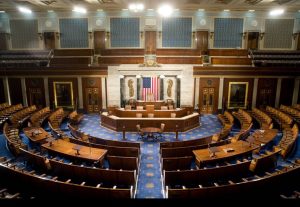
Senate Advances Compromise to End Record Government Shutdown
Share your love
 -Editorial
-Editorial
The Senate took its first major step toward ending the 41-day federal government shutdown that began on October 1, voting 60-40 to advance a bipartisan spending package that could reopen the government within days.
The agreement must still be approved by the House of Representatives and signed by the President.
The vote came after a group of moderate Democrats agreed to proceed without a guaranteed extension of the Affordable Care Act (ACA) tax credits, angering many in their caucus who argued the party should continue fighting for the subsidies. The move sets up several days of procedural action before a final vote on the bill, possibly later this week.
The compromise, negotiated by three former governors—Sens. Jeanne Shaheen (D-N.H.), Maggie Hassan (D-N.H.), and Angus King (I-Maine)—would fund the government through late January 2026 and commit the Senate to holding a mid-December vote on extending the ACA health care tax credits, which are set to expire January 1. The deal broke a six-week stalemate that left nearly 900,000 federal employees furloughed and another two million working without pay.
President Donald Trump reacted to the Senate’s action with cautious optimism, while reaffirming his firm stance on immigration and federal spending. “It looks like we’re getting close to the shutdown ending,” Trump told reporters on Sunday. “We’ll never agree to give any money to prisoners or illegals who come into our country, and I think the Democrats understand that.”
Senate Majority Leader John Thune (R-S.D.) endorsed the agreement Sunday night and called an immediate vote to begin the process of approval. Senate Democratic Leader Chuck Schumer (D-N.Y.) voted against moving the measure forward, joined by all but eight Democrats, saying it fell short of protecting key health care benefits for millions of Americans.
“America is in the midst of a Republican-made health care crisis — a crisis so severe, so urgent, and so devastating for American families that I cannot support a continuing resolution that fails to address it,” Senate Democratic Leader Chuck Schumer wrote on X. “I am voting no.”
The shutdown began when Congress failed to approve appropriations for the 2026 fiscal year. The Republican-controlled House passed a continuing resolution to keep the government open, but the Senate rejected it 14 times over disputes about the ACA subsidies. Democrats insisted that any funding bill include an extension of the expanded subsidies originally authorized under the Inflation Reduction Act of 2022.
The prolonged shutdown has had sweeping effects across the country. Essential programs such as Medicare and Medicaid have continued, but major agencies including the Centers for Disease Control and Prevention, the National Institutes of Health, and the Environmental Protection Agency have experienced significant disruptions. Nutrition assistance through the Women, Infants, and Children (WIC) program and the Supplemental Nutrition Assistance Program (SNAP) has been delayed or reduced, affecting millions of low-income families.
Military personnel have remained on active duty but have missed paychecks, while veterans’ services, education funding, and tribal assistance programs have been curtailed. Economic analysts estimate the shutdown has cost the U.S. economy about $15 billion per week, slowing growth and straining state and local resources. Food banks across the country have reported surges in demand from furloughed workers and families who lost federal benefits.
If enacted, the new spending package would reopen shuttered agencies, guarantee back pay for federal workers, and provide short-term stability to public programs. However, it would not resolve the deeper political conflict over federal health care subsidies and long-term budget priorities.
The Affordable Care Act’s expanded subsidies—first increased under the American Rescue Plan Act of 2021 and extended through 2025 by the Inflation Reduction Act—have lowered health insurance costs for millions of middle- and lower-income Americans. Without congressional action, those subsidies will expire at the end of the year, potentially raising premiums for millions of households.
The 2025 shutdown is the longest in U.S. history, surpassing the 35-day closure that began in December 2018. It is also the 11th shutdown to result in federal employee furloughs since the modern budget process was established.



